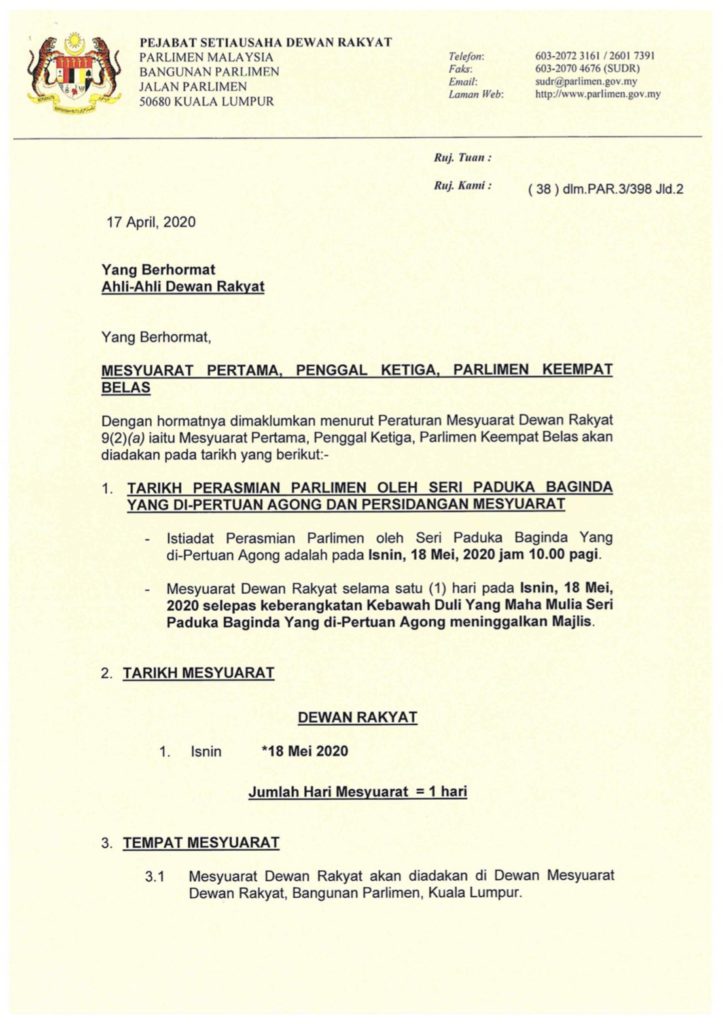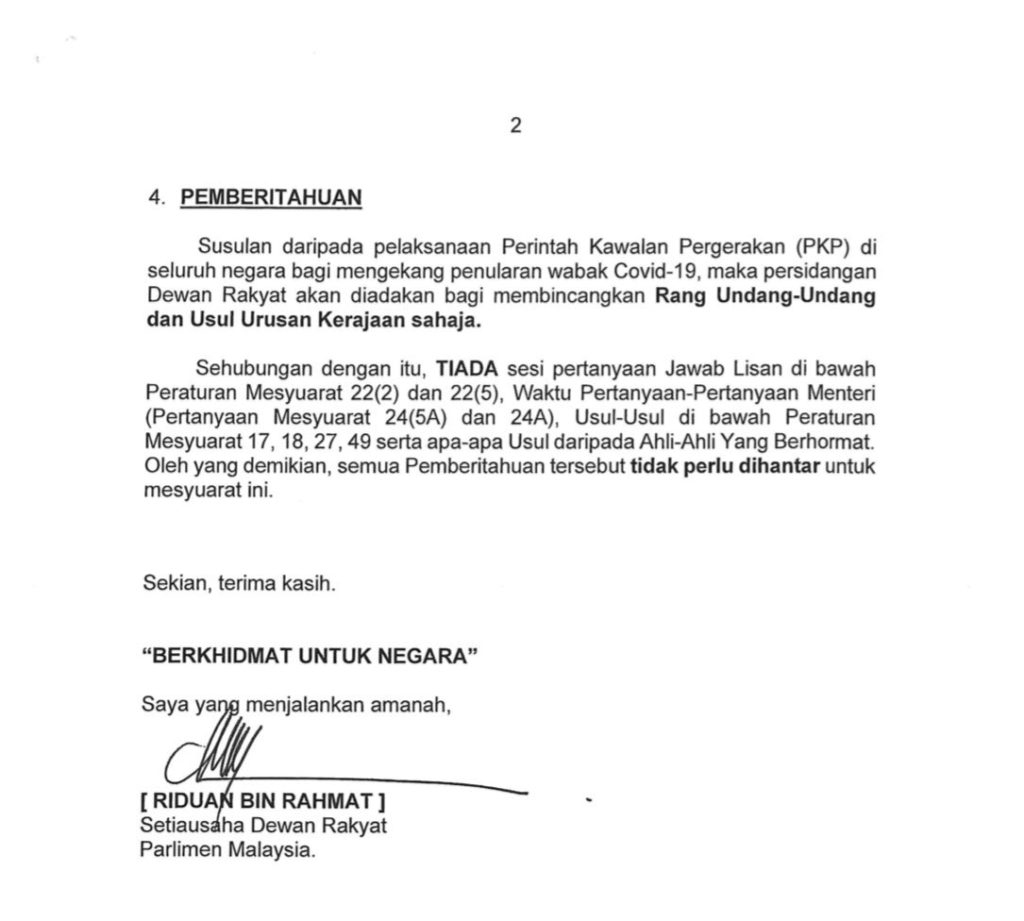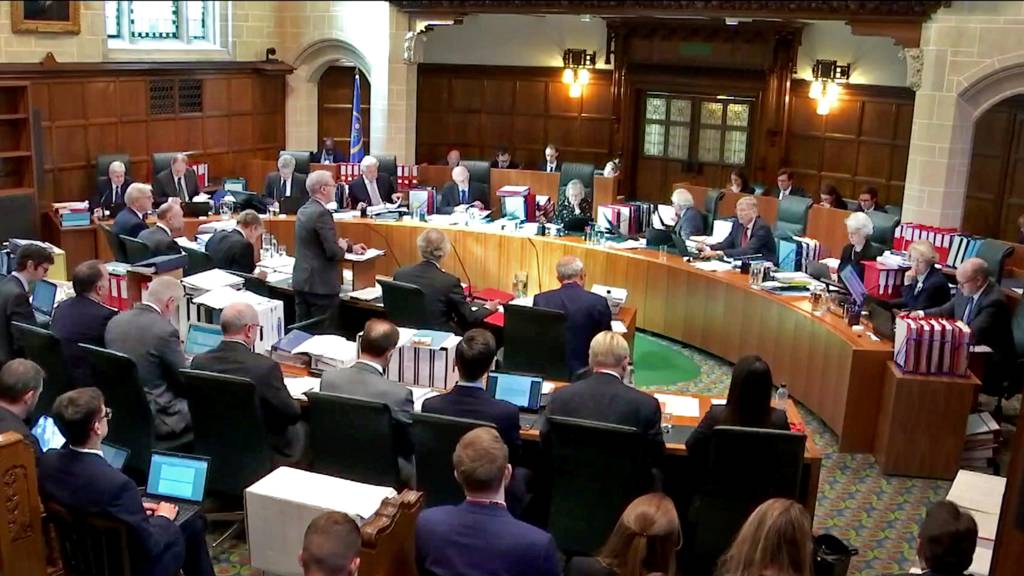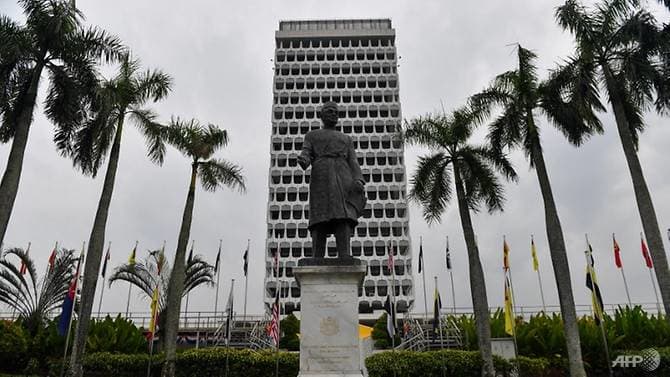“This Parliament is the crown and climax of our Constitution: in fact, it is the very essence.”
– Tuanku Abdul Rahman ibni Almarhum Tuanku Muhammad, YDPA of the Federation of Malaya (Dewan Ra’ayat Hansard, 12 September 1959)
The Background
After the Perikatan Nasional Government was formed on 1st March 2020, Prime Minister Muhyiddin Yassin postponed the convening of Parliament (which was slated to commence on 9th March) for 2 months to 18th May 2020.
Many analysts interpret this as testament of Muhyiddin’s lack of support from MPs to resist a vote of no confidence. And that he was buying time in order to consolidate such support.
Constitutionally, the Prime Minister can advise the YDPA to postpone Parliament in such manner – provided that it is not more than 6 months since the last sitting (Art 55(1)).
The last sitting of the Dewan Rakyat was 5th Dec 2019, while the Dewan Negara was 19th Dec 2019. Thus, the last date which Muhyiddin could stretch the convening of Parliament to would be 19th June 2019.
Ever since then, the Opposition and civil society have called for Muhyiddin to convene Parliament in order to deliberate on the stimulus packages and steps to collectively address the Covid-19 pandemic. Such calls have not been entertained.
Hence, many were looking forward to the scheduled 18th May 2020 parliament sitting.
The 1-Day Sitting


However, in a recent letter dated 17th April 2020, the Secretary of Parliament announced that there would only be a 1-day sitting for the 1st Meeting in the 3rd Term of the 14th Parliament. This is unprecedented in modern times. Historically, any meeting of Parliament usually lasts around 30 consecutive days.
The letter also states that that there will be the customary address by the YDPA which starts at 10am.
More importantly, it states that only Government Motion and Bills will be discussed. The letter specifically mentions that there will be no Minister’s Question Time and discussion of any Motions filed by MPs.
Reason Behind & Effect of the 1-Day Sitting

Source: Bernama
Todate, no explanation has been given by the Prime Minister for this unusual arrangement.
What could be the reason behind this? So far, the following facts are clear:
(1) Muhyiddin’s Government is a newly formed one which has not yet been tested in Parliament.
(2) Muhyiddin needs to convene Parliament at least by 19th June 2020, otherwise he is in violation of Article 55(1).
(3) Muhyiddin however faces the risk of:
(a) a motion of no confidence by the Opposition; or
(b) demonstrating he doesn’t possess confidence of the House if any Supply Bill or important motions (such as the motion of thanks after the Royal Address) are not passed by the majority of MPs.
(4) From a reading of the 17th April 2020 letter, the 1-day sitting:
(a) prevents any motion of no confidence to be tabled; and
(b) will not involve any voting on Government Motion/Bills, and therefore no showcase of whether Muhyiddin commands confidence of the House. This is based on past precedent: immediately after a royal address by YDPA, sitting will be adjourned to the next day (such as on the last 2 sessions i.e. 11th March 2019 and 17th July 2018). Even if this doesn’t happen, there will customarily be a debate on the YDPA’s speech for about 2 weeks and there will be no voting in between.
(5) No reasonably early date has been fixed for the next meeting of Parliament
Given the above facts, it would be reasonable to deduce that Muhyiddin is convening Parliament merely to comply (barely) with the technical requirements of Article 55(1), and is attempting to prevent his Government from facing a confidence vote.
Or, in the worst case scenario, Muhyiddin may be abusing such technicalities to minimize the number of sittings for each session (1 day here) while maximizing the gap between two sessions (maximum 6 months). This is so his Government may never need to be accountable in a meaningful way to Parliament until possibly the next General Election.
Could Covid-19 be an excuse? As Gurdial Singh Nijar suggests, it is not, because Parliament can incorporate social distancing in seating arrangements, wearing of masks, and even convene by tele-conferencing. Other Legislatures across the world have managed to do the same with precautions, as well as in Penang.
The crucial question is: given the above facts and context, is Muhyiddin’s fixing of a 1-day parliamentary sitting constitutional or unlawful?
The UK Prorogation Case

Source: BBC
Recent high authority from the UK Supreme Court suggests such action is unconstitutional. UK Prime Minister Boris Johnson advised the Queen to prorogue (discontinue) a Parliament session and to reconvene just 17 days before the UK’s scheduled departure from the European Union. Many perceive this as an attempt by Boris Johnson to avoid parliamentary scrutiny on the Government’s Brexit plans in the final weeks leading up to Brexit. This decision was challenged in court.
The first question was whether this decision could be reviewed by the Judiciary? Yes, ruled the Court. Otherwise, “(T)he sovereignty of Parliament would be undermined as the foundational principle of our constitution if the executive could, through the use of the prerogative, prevent Parliament from exercising its legislative authority for as long as it pleased.”
The Court quoted Lord Bingham: “the conduct of government by a Prime Minister and Cabinet collectively responsible and accountable to Parliament lies at the heart of Westminster democracy”.
The Court then laid down this important constitutional principle:
“A decision to prorogue Parliament (or to advise the monarch to prorogue Parliament) will be unlawful if the prorogation has the effect of frustrating or preventing, without reasonable justification, the ability of Parliament to carry out its constitutional functions as a legislature and as the body responsible for the supervision of the executive. In such a situation, the court will intervene if the effect is sufficiently serious to justify such an exceptional course.“
The Court then ruled that Boris Johnson’s prorogation was unlawful: “(I)t is impossible for us to conclude, on the evidence which has been put before us, that there was any reason – let alone a good reason – to advise Her Majesty to prorogue Parliament. We cannot speculate, in the absence of further evidence, upon what such reasons might have been. It follows that the decision was unlawful.’
Conclusion
If the 5 facts above remain, it can certainly be argued that Muhyiddin’s 1-day parliamentary sitting has the effect of frustrating or preventing, without reasonable justification, the Dewan Rakyat’s ability to carry out its constitutional function to supervise the Executive and (more importantly) to test whether this Government commands the confidence of the House.
It is also trite law constitutional provisions should not be interpreted with “the austerity of tabulated legalism” and in a manner which renders them “ineffective and illusory” (Semenyih Jaya Sdn Bhd v Pentadbir Tanah Daerah Hulu Langat [2017] 3 MLJ 565, FC and Madhuvita Janjara Augustin v Augustin a/l Lourdsamy & Ors [2018] 1 MLJ 307, CA)
The Government hence cannot wring its hands and say “Look, technically, Art 55(1) has been complied with. There is no requirement that Parliament must sit for more than 1 day in a single meeting”.
Such perverse reading would render the Legislature’s constitutional function to supervise the Executive “ineffective and illusory”, and is thus unconstitutional.
